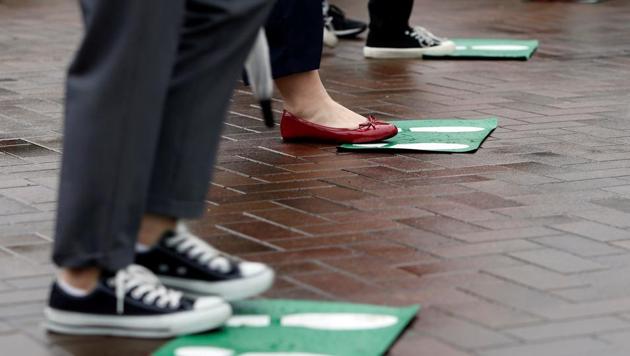Covid-19 pandemic: Working memory capacity plays major role in social distancing compliance
The researchers found individuals with higher working memory capacity have an increased awareness of benefits over costs of social distancing and, subsequently, show more compliance with recommended social distancing guidelines during the early stage of the COVID-19 outbreak.
The crucial finding of a research paper suggest that whether you decide to engage in social distancing in the early stages of COVID-19 depends on how much information your working memory could hold.

This research paper published in the Proceedings of the National Academy of Sciences was co-authored by Weiwei Zhang, an associate professor of psychology at the University of California, Riverside. The study offers potential strategies to mitigate social distancing noncompliance in a public health crisis.
The researchers found individuals with higher working memory capacity have an increased awareness of benefits over costs of social distancing and, subsequently, show more compliance with recommended social distancing guidelines during the early stage of the COVID-19 outbreak.
Working memory is the psychological process of holding information in the mind for a brief period of time - typically, just seconds. The amount of information working memory can hold briefly -- its capacity -- is predictive of many mental abilities such as intelligence, comprehension, and learning.
“The higher the working memory capacity, the more likely that social distancing behaviours will follow,” said Zhang, the paper’s senior author. “Interestingly, this relationship holds even after we statistically control for relevant psychological and socioeconomic factors such as depressed and anxious moods, personality traits, education, intelligence, and income.”
In the United States, where social distancing is mostly voluntary, widespread noncompliance persists and was especially high during the early stages of the COVID-19 pandemic. According to Zhang, one reason for this is concerns about the inherent socioeconomic costs associated with social distancing. But what constitutes an individual’s cognitive ability to come to a decision regarding compliance with social distancing guidelines remains largely unclear.
“Our findings reveal a novel cognitive root of social distancing compliance during the early stage of the COVID-19 pandemic,” Zhang said. “We found social distancing compliance may rely on an effortful decision process of evaluating the costs versus benefits of these behaviours in working memory -- instead of, say, mere habit. This decisional process can be less effortful for people with larger working memory capacity, potentially leading to more social distancing behaviours.”
The study included the participation of 850 U.S. residents from March 13 to March 25, 2020 -- the first two weeks following the U.S. presidential declaration of a national emergency about the COVID-19 pandemic.
Participants first filled out a demographic survey. Then they completed a set of questionnaires that captured individual differences in social distancing compliance, depressed mood, and anxious feelings. Personality variables, intelligence, and participants’ understanding of the costs and benefits of social distancing practice were measured also.
“Individual differences in working memory capacity can predict social distancing compliance just as well as some social factors such as personality traits,” Zhang said. “This suggests policymakers will need to consider individuals’ general cognitive abilities when promoting compliance behaviours such as wearing a mask or engaging in physical distancing.”
Zhang and his colleagues recommend media materials for promoting norm compliance behaviours to avoid information overload.
“The message in such materials should be succinct, concise, and brief,” Zhang said. “Make the decision process easy for people.”
The study’s findings also suggest learning social distancing as a new norm requires an effortful decision process that relies on working memory.
“The bottom line is we should not rely on habitual behaviours since social distancing is not yet adequately established in U.S. society,” Zhang said. “Before social distancing becomes a habit and a well-adopted social norm, the decision to follow social distancing and wearing masks would be mentally effortful. Consequently, we will have to deliberately make the effort to overcome our tendency to avoid effortful decisions, such as to not practice social distancing.”
Zhang expects the contribution of working memory will decline as new social norms, such as wearing a mask or socially distancing, are acquired by society over time.
“Eventually social distancing and wearing face masks will become a habitual behaviour and their relationship with working memory will diminish,” he said.
Next, the team will analyze data is collected across the United States, China, and South Korea to identify protective social and mental factors that help people cope with the pandemic.
The researchers have also been collecting data assessing how working memory is related to racial discrimination during the pandemic.
(This story has been published from a wire agency feed without modifications to the text. Only the headline has been changed.)
Catch your daily dose of Fashion, Taylor Swift, Health, Festivals, Travel, Relationship, Recipe and all the other Latest Lifestyle News on Hindustan Times Website and APPs.



